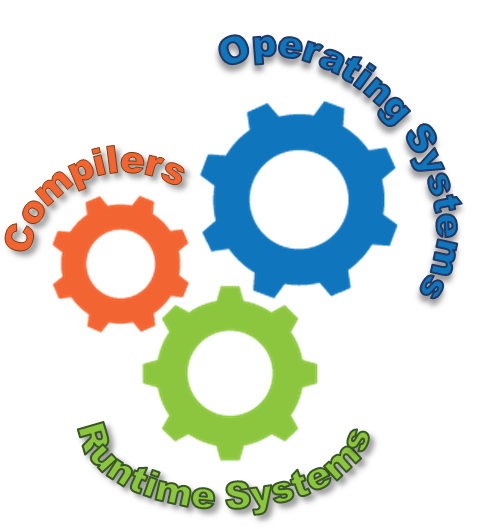
Compilers, Operating, and Runtime Systems for
Modern and Emerging Architectures
| Home | |||||
Memory Management for Modern and Emerging Architectures
Dynamic CompilationPerformance and energy efficiency in the memory subsystem is a critical factor for a wide range of computing applications. Trends such as the increasing demand for data analytics (i.e. Big Data) and the desire to multiplex physical resources to improve efficiency have driven the adoption of memory systems with larger power, bandwidth, and capacity requirements. Additionally, with the advent of new memory technologies (such as persistent memory and die-stacked RAMs), systems are beginning to incorporate multiple types of memory devices, each with varying capabilities and performance. Not surprisingly, it is very challenging to obtain precise control over the distribution and usage of memory power or bandwidth when virtualizing system memory. These effects depend upon the assignment of virtual addresses to the application's data objects, the OS binding of virtual to physical addresses, and the mapping of physical pages to hardware memory devices.
To address these challenges, we are investigating approaches to memory management that increase collaboration between layers of the vertical execution stack (i.e. compilers, applications, middleware, operating system, and hardware). Our current projects include:Publications: MemSys 2019 (a), MemSys 2019 (b), CC 2019, NAS 2018, TACO 2018, ARCS 2018, OOPSLA 2015, VEE 2013
- Development of offline and online profiling to predict data access patterns
- Cross-layer strategies to improve performance and power efficiency in DRAM
- Adapting heap layouts to exploit features of heterogeneous memory architectures
Exploiting Phase Interactions during Phase Order SearchPrograms written in managed languages, such as Java and C#, execute in the context of a virtual machine (VM) (also called runtime system) that compiles program methods at runtime to achieve high-performance emulation. Managed runtime systems need to consider several factors when deciding how, when, or if to compile program methods, including: the compiling speed and code quality produced by the available compiler(s), the execution frequency of individual methods, and the availability of compilation resources. Our research in this area explores tradeoffs involved in selective compilation and the potential of applying iterative search techniques to dynamic compilers.
We are currently exploring:Publications: LCTES 2017, TACO 2016, LCTES 2016, TACO 2013, VEE 2013
- How to schedule method compiles for JITs with multiple optimization tiers
- Dynamic compilation policies for multi- and many-core machines.
- Program profiling for feedback-directed optimization
Program-specific or function-specific compiler optimization phase sequences are universally accepted to achieve better overall performance than any fixed optimization phase ordering. In order to find the best combination of phases to apply to a particular function or program, researchers have developed iterative search techniques to quickly evaluate many different orderings of optimization phases. While such techniques have been shown to be effective, they are also extremely time consuming due to the large number of phase combinations that must be evaluated for each application. We conduct research that aims to reduce the phase ordering search space by identifying and exploiting certain interactions between phases during the search. In addition to speeding up exhaustive iterative searches, this work has led to the invention of a technique that can improve the efficacy of individual optimization phases, as well as novel heuristics that find more effective phase ordering sequences much faster than current approaches.
Publications: CASES 2013 S:P&E 2013, CASES 2010, Masters Thesis (2010), LCTES 2010